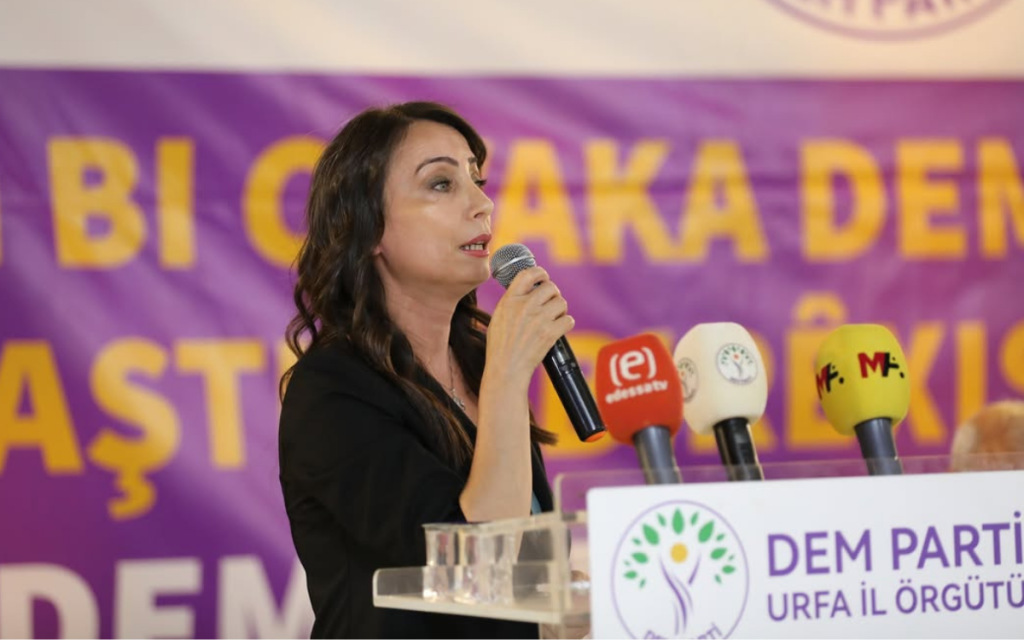The recent congress of the Democratic Regions Party (DEM) in the Haliliye district of Urfa gathered a substantial audience, including influential figures such as Mehmet Öcalan, the brother of notorious PKK leader Abdullah Öcalan. The dual election of Ayşe Sürücü and Nihat Demirbilekli as co-chairs for the party’s Urfa branch marks a significant moment for the party amidst evolving political dynamics in the region. As the congress unfolded, various speakers addressed the growing challenges and aspirations faced by the Kurdish population in Turkey, particularly in light of governmental policies and regional geopolitics.
| Article Subheadings |
|---|
| 1) A pivotal gathering for the DEM party |
| 2) Regional dynamics and geopolitical implications |
| 3) Urgent demands for political and social change |
| 4) Concerns over the government’s judicial reform |
| 5) The path forward for the Kurdish political landscape |
A pivotal gathering for the DEM party
The congress convened in Haliliye on June 1, attracting a notable turnout of political figures and civil society advocates. Among the well-known attendees was Mehmet Öcalan, representing a significant familial connection to the PKK, which carries much weight in Kurdish politics. Ayşe Sürücü and Nihat Demirbilekli were selected co-chairs of the Urfa branch, indicating a shift in leadership dynamics and a renewed commitment to the party’s core values. The congress not only served as a platform for these leaders to consolidate their roles but also brought the community together in a show of unity amidst the challenging political landscape.
Regional dynamics and geopolitical implications
At the congress, Hatimoğulları highlighted how the Middle East’s geopolitical landscape is undergoing substantial changes, especially following the conflicts in Syria. She noted that these shifts create complex scenarios that could present opportunities for peace and democratic reforms. By referencing Abdullah Öcalan‘s philosophies, she articulated a vision for a future-oriented transformation that can address the needs and aspirations of the Kurdish people. The backdrop of global conflicts lends urgency to her message, framing the congress as not merely a local event but a vital commentary on the evolving regional dynamics that will affect many communities in the future.
Urgent demands for political and social change
During her address, Hatimoğulları called for immediate action from the government, particularly the withdrawal of appointed trustees in Kurdish-majority municipalities. She emphasized the importance of reinstating elected co-mayors in areas like Halfeti, Suruç, and Viranşehir. This demand reflects widespread frustrations amongst constituents, who have been adversely affected by the current governance structure that prioritizes appointed officials over elected representatives. The demand for action was underscored by ongoing police operations and detentions targeting political opposition. In her speech,
“Actions speak louder than words. Equality, freedom, peace, and brotherhood are not ordinary terms,”
further emphasizing the critical need for real change rather than mere rhetoric.
Concerns over the government’s judicial reform
As discussions unfolded at the congress, Hatimoğulları expressed palpable dissatisfaction regarding the government’s newly proposed judicial reform package. She articulated that the reforms fell significantly short of what was necessary, particularly as they did not include measures advocated by the DEM Party, such as legal safeguards for Covid-19-related issues or reforms impacting political detainees. This lack of attention to pressing political concerns not only disappointed party members but also heightened worries about the future of legal and human rights protections in Turkey. With thousands of political prisoners and their families eagerly awaiting reforms, the need for meaningful change resonates deeply within the community.
The path forward for the Kurdish political landscape
The congress culminated with an emphasis on the steps needed to advance the Kurdish political landscape in Turkey. Hatimoğulları asserted that the government must embrace a more proactive and compassionate approach toward the Kurdish population. As local and national politics evolve, these calls for equality and recognition signal a critical reflection point for the broader political establishment and society. By fostering dialogue and inclusion, the aim is to bridge the divides and cultivate a more harmonious and democratic community for all citizens. The congress showcased not only the aspirations of the DEM Party but also the pressing agenda they feel must be pursued urgently.
| No. | Key Points |
|---|---|
| 1 | The DEM Party congress in Urfa convenes key political figures and civil society reps. |
| 2 | Calls for political change centered on withdrawing appointed trustees in Kurdish municipalities. |
| 3 | Criticism of government’s proposed judicial reform package announced during the congress. |
| 4 | Discussion of regional geopolitical dynamics following conflicts in Syria and their effects on Kurdish aspirations. |
| 5 | The need for immediate actions to ensure peace and inclusion in society highlighted by party leaders. |
Summary
The recent congress of the DEM Party in Urfa serves as a significant expression of the Kurdish population’s political aspirations, encapsulated in calls for leadership change and urgent reforms. Through discussions on judicial changes and a collective vision for the future, the congress has kickstarted dialogue that may influence the evolving political landscape in Turkey. As the country navigates complex regional dynamics, the DEM Party’s calls for action embody the growing demands for peace, equality, and representation in governance.
Frequently Asked Questions
Question: What was the primary outcome of the DEM Party congress?
The primary outcome was the election of Ayşe Sürücü and Nihat Demirbilekli as co-chairs of the party’s Urfa branch, alongside significant calls for political reform.
Question: Why was there criticism regarding the government’s judicial reform package?
The criticism stemmed from the perceived inadequacy of the reforms, which did not address essential changes sought by the DEM Party, particularly concerning political prisoners.
Question: What demands were made regarding appointed trustees in municipalities?
Demands were issued for the immediate withdrawal of appointed trustees in Kurdish-majority municipalities and the reinstatement of elected local leaders, emphasizing the importance of representative governance.


